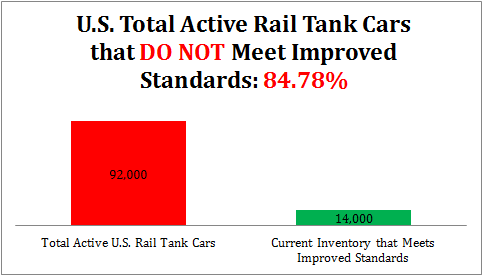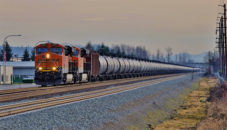Unprecendented order for 5000 cars
On Thursday, February 20th, BNSF Railway, owned by Warren Buffet’s Berkshire Hathaway investment group and thus the only fully privately held Class I railroad in North America, announced that it would purchase a fleet of some five thousand new tank cars to carry crude oil.

A BNSF unit train carrying crude oil passes through the heart of downtown Hinsdale, Illinois on the railroad’s main line west of Chicago on July 29th, 2012. Such shipments, often headed to East Coast refineries, have vastly increased since the development of the Bakken Shale Formation in North Dakota over the last half decade. Since the fatal Lac Megantic, Quebec derailment and fire in July of 2013, such movements have generated far more concern in local communities than had previously been the case. (Photo copyright 2013, Paul Burgess)
This is highly unusua — even unprecedented — in the North American rail industry. Normally, railroads own relatively few tank cars themselves; instead, they own the locomotives and employ the crews which pull the cars and provide the infrastructure (track and signals, etc) over which they travel, with shippers themselves owning the vast majority of the tank cars. However, recent events involving the current “DOT-111” tank car model’s alleged poor performance in derailments has led to calls to replace or refit the present fleet, estimated by the American Association of Railroads (AAR) in 2013 at some 92,000 active units, with cars incorporating the most current safety standards; this typically involving strengthened tank hulls and protected fill and discharge fittings to minimize the chance of leak or rupture in an accident.
AAR estimates that only about 14,000 of the current active fleet meets or exceeds the new standards. Recent federal regulatory actions point at soon-to-be-mandated increased safety and construction standards in both the United States and likely corresponding action in Canada (for which, see my previous blog posts on the subject); however, BNSF is acting well in advance of any such mandate. Other reports indicate that major crude shippers such as Tesoro and Valero are similarly considering greatly accelerated and/or increased volume purchase programs for the new standard cars.
The actions come as a firestorm of negative press surrounding the safety of the rail transport of crude oil in both the United States and Canada continues to erupt, with greatly increased attention paid by both regulatory agencies and the general public to the issue. The passage of unit trains of crude oil through the heart of otherwise quiet communities, and the potential hazards thereof, are suddenly far more on the minds of local leaders. Various calls have sounded to give local communities a greater voice in what is allowed to pass through their area, or to allow them to tax or to impose fees in one way or another on such passage, and while federal interstate commerce rules are highly unlikely to allow devolution of this nature any time soon, clearly both railroads and shippers are aware that it is incumbent on them to do all they can to increase the safety of transport of this vital, and for railroads, highly profitable, commodity. As a privately owned firm, BNSF enjoys somewhat greater ease in making capital purchases in a rapid fashion than is sometimes the case with companies that are publicly held, and have directors representing a wide array of interests. For BNSF to commit to a purchase of such magnitude in an equipment area that is typically little involved in by the railroads themselves indicates just how seriously the industry is taking the newly increased level of concern.
Occasionally, watershed events, unfortunately often tragic, occur in the transport of hazardous materials which fundamentally change the nature of the service. Long time veterans of the industry still point to the Valujet airline disaster in 1996 as transformative in the way air transport of hazardous materials is regulated and practiced. While it is still “early days” in regards to the Lac Megantic derailment, its effects so far give every sign of being as important to the rail industry as Valujet was to air transport.
Labelmaster is a full service provider of goods and services for the Hazardous Materials and Dangerous Goods professional, shippers, transport operators, and EH&S providers. See our full line of solutions at www.labelmaster.com.
Related Products:


CHLORINE GAS TRANSPORTATION SAFETY
First Responders ask federal administrations to consider adding secondary containment to rail tank cars used to transport chlorine gas, providing lifesaving safety to First Responders and the public they serve. See First Responders Comments at PETITION C KIT.